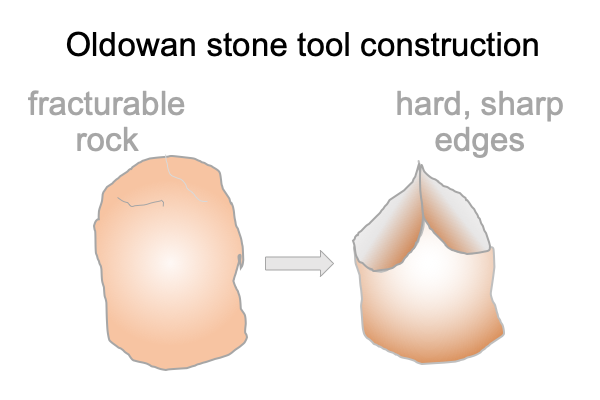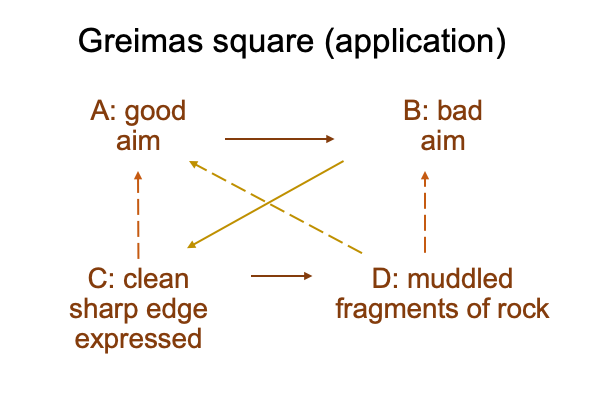0071 For physical anthropologists, a familiar instance of a whole bringing its parts into being through proper governanceis the Oldowan stone tool.
The Oldowan stone tool is made on the spot by hitting one stone against another in a specific manner, causing the target stone to fracture. After a series of blows, the target stone expresses a sharp, jagged edge, making the stone tool like a giant tooth, capable of stripping muscle off bone and cracking long bones in order to expose the marrow fat.

0072 What is going on?
The whole stone on the left has within it, parts that are removed when struck, with good aim, by another rock. The result is the Oldowan stone tool on the right.
If I go back to Aquinas’s Greimas square and replace “soul” with “aim” and “body” with “stone”, then I obtain another way to appreciate the implications of Aquinas’s formulation.

0073 Without a doubt, Aquinas idealizes the prelapsarian adamah, because he works from the Biblical text, written in Latin, not in the common vernacular. He also examines philosophical texts, translated from Arabic to Latin. He “baptizes” Aristotle and other ancient Greek philosophers. So, the prelapsarian Adam seems like an incredible person, just like the philosophers of old.
0074 Aquinas lives two centuries before the Europeans “discover” the Americas, populated by peoples who were exposed to speech-alone talking civilizations, but were not quite ready to surrender their happy-go-lucky hand-speech talking ways. These hand-speech talking folk appear radically naive to the Europeans. Some might say that the descriptor, “original innocence”, applies to the North American Plains Indians. They have no idea that Eurasian civilizations are three-thousand years older than the earliest American civilizations.
Late-medieval Europeans are shocked by reports of life in the Americas. Indeed, early modern Europeans are dismayed after some of these hand-speech talking Americans learn European languages and say, “Y’all are the most miserable creatures that I can imagine.”
0075 Once this connection is made, everything changes.
Aquinas’s exploration into the nature of the prelapsarian adamah does not apply to some sort of philosopher king. It applies to a noble savage. Even weirder, it applies to noble savages who could not express the qualifier, “noble”, using hand-talk. No, these savages embody everything that makes humans noble. But, they have no gesture-word corresponding to the speech-alone term, “noble”.
What is there to picture and point to?
0076 The conceptual shift is jarring, accounting for John Paul II’s use of Aquinas as a soapbox on which to stand while proclaiming “biblical teachings” from passages of Genesis that must be regarded as prelapsarian. The Genesis passages point to a Lebenswelt on the other side of the first singularity, to a time when we are who we evolved to be.
John Paul II suspects, but does not articulate, that the soap-box on which he stands contains a pot of conceptual gold.
0077 How can that stone, lying next to the partially eaten remains of… a dead wildebeest… say, “I am the target stone that contains, within me, the sharp edges that will provide the toothiness you need to scrape dried meat from ligaments and crack long bones to get the marrow fat.”?
Even the stones cry out.
Grace inflows nature.
The hominin knows, at a glance, that this stone will do. After a few sharp blows, the Oldowan tool is in hand, ready for work. Other members of the team stand by, also holding little stones, watching for any sight of a curious predator. Yet, potentially disruptive predators know that these hominins can injure from a distance. There is nothing quite as unforgiving as a well-thrown stone.
0078 Yes, grace is everywhere. It flows through the scene, where a team of hominins scavenge from the corpse of a wildebeest, in the open, on the savannah, which is a dangerous place to linger. No one works alone. Everyone belongs to the team. Without grace, the lucky find would be worthless.
